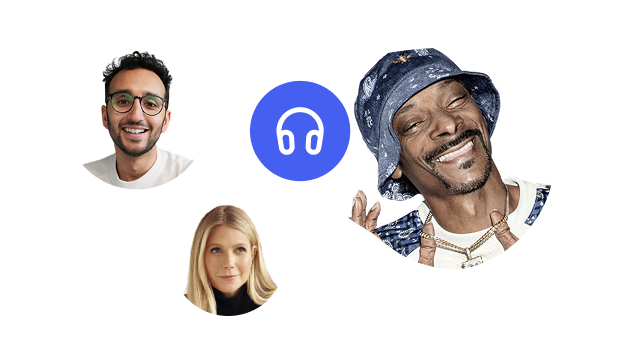If you're new to the world of audiobooks, you might have some questions about whether services like Audible use actual voices in their productions.
The answer is a resounding yes. In fact, the human voice is a cornerstone of the audiobook industry, a dynamic realm where voice actors, or audiobook narrators, breathe life into the written word.
What is Audible?
Audible, owned by Amazon, is a major player in the audiobook industry. It offers an extensive collection of audiobooks, podcasts, and other spoken-word entertainment. From bestsellers to indie publications, Audible caters to a diverse audience of book lovers, providing an immersive, audio-based experience that goes beyond traditional reading.
An Audible narrator is a voice actor who records books for Audible, using their vocal skills to bring the story to life and provide an immersive listening experience.
Does Audible Use Real Voices For Its Content And If So, How Do They Source This Talent
Every Audible audiobook is narrated by a real person. Audible sources this talent through a variety of avenues. Some narrators are professionals in the voice-over industry, while others are actors or even authors themselves.
Audiobook narrators utilize their unique vocal skills to convey different characters, emotions, and narrative nuances. Whether you're listening to the thrilling prose of a Stephen King novel or the enchanting world of Harry Potter, it's the voice actor's performance that truly brings the story to life.
How does Audible find its narrators?
Audible finds narrators primarily through the platform ACX (Audiobook Creation Exchange), also owned by Amazon. ACX is a marketplace where authors, rights holders, and publishers can post their books for auditions. Here, budding voice actors can audition for narration work and potentially launch their careers in the audiobook industry.
The process usually works like this:
1. Audition Process: Authors or rights holders post a portion of their book on ACX and invite voice actors to audition.
2. Selection: After listening to the auditions, the author or rights holder selects a voice that they believe best fits their book.
3. Agreement: Once a narrator is chosen, the parties agree on the terms of the contract, including how the narrator will be paid (either a flat rate per finished hour of audio or a share of royalties).
4. Production: The narrator then records the book, often in their own home studio, and uploads the finished files to ACX for the rights holder's approval.
5. Distribution: Once approved, the audiobook is then distributed on Audible, Amazon, and iTunes.
Aside from ACX, Audible also works with professional narration studios and has a roster of established voice actors for their original productions and popular titles. Some well-known authors or publishers might also have specific narrators they prefer to work with, and Audible facilitates these collaborations.
Can Anyone Narrate Audiobooks?
In theory, anyone can become an audiobook narrator. However, professional voice acting involves more than simply reading aloud. It requires the ability to perform different voices, master audio editing, and sometimes even operate a home studio. Tools like Audacity, a free audio editing software, are essential to a narrator's toolkit.
As for compensation, payment varies. Some narrators are paid a flat rate or per finished hour (PFH), while others opt for a royalty share agreement, receiving a percentage of the audiobook's sales.
SAG-AFTRA union rates started at $225 PFH, but rates can vary significantly depending on the book and the narrator's experience.
What is the most common language for audiobooks?
Currently, English is the most common language for audiobooks due to the widespread use of English worldwide and the significant amount of published content in the language.
Are audiobooks read by AI?
While Audible primarily uses human narrators, it's important to note the presence of artificial intelligence (AI) in the audiobook realm. Text-to-speech technologies and AI voices, such as those found in Amazon's Kindle or Apple's Siri, can read out written content. However, these lack the emotional depth and variability of a human voice, making the audiobook experience less engaging.
How are audiofiles created and used in the process of audiobook production and voice narration?
In relation to audiobooks and voice narration, "audiofiles" typically refer to the digital files that store the recorded voice of the narrator. These are the result of the voice-over work that narrators do, often in a home or professional studio.
Here's how they fit into the process:
1. Recording: The narrator reads the text of the book out loud and records it, creating raw audiofiles.
2. Editing: These raw audiofiles are then edited to remove mistakes, awkward pauses, background noises, etc. This process ensures that the narration is smooth and pleasant for the listener.
3. Finalization: The edited audiofiles are then compiled in the correct order to align with the book's structure. This creates the final audiobook.
4. Distribution: The finalized audiofiles of the audiobook are then uploaded to platforms like Audible, where they can be accessed by consumers.
The term "audiofile" can also refer to an enthusiast or connoisseur of high-quality sound, particularly in the context of audiobooks
The Benefits of Listening to Audiobooks
Listening to audiobooks offers several benefits over traditional reading. For starters, they're accessible. Whether you're driving, cooking, or simply relaxing, you can immerse yourself in a fiction book or delve into a favorite narrator's rendition of a classic novel. They're also excellent for people who struggle with traditional reading due to dyslexia or visual impairments.
Moreover, the skillful use of different voices by a voice actor can provide an immersive experience, adding a new dimension to the story. Award-winning narrators have the ability to make characters and settings come alive, offering listeners a unique, often cinematic experience.
The human voice is, without a doubt, at the heart of the Audible audiobook experience; and if it's your first time listening to an audiobook or you're a seasoned fan, the versatility of voice-over work and the talent of narrators never ceases to enhance the joy of storytelling.
So, regardless of whether you're an Android or Apple user, explore the vast library of human-narrated content available on platforms like Audible and dive into a new adventure today.




